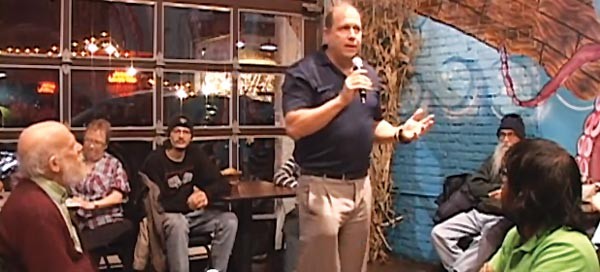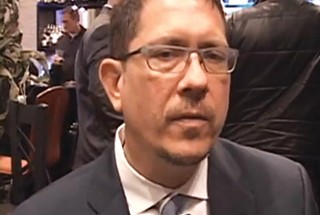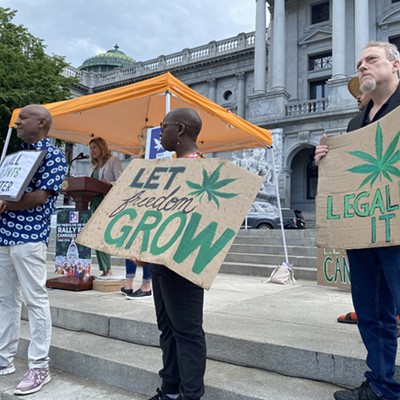Any euphoric feelings occurring May 12 after the Pennsylvania State Senate overwhelmingly passed its second medical-marijuana bill in eight months didn't last long before the hangover set in.
Days after the senate voted 40-7 to pass legislation legalizing the use of cannabis extracts for medicinal purposes, House Speaker Mike Turzai sent the bill to the house health committee and into the hands of state Rep. Matt Baker (R-Wellsboro), the committee's chair and a staunch opponent of such legalization. And that leaves many wondering whether it's ever going to leave.
"I'm becoming more and more skeptical that we'll ever be able to pass any sort of cannabis legislation in this state that will actually be a benefit to people," says Patrick Nightingale, a Pittsburgh defense attorney and head of Pittsburgh NORML, a cannabis-advocacy group. "And even if it would somehow get out of committee and pass, we'll likely not see a single gram of Pennsylvania-produced medicine before 2018 because we'll need a complete set of regulations drawn up.
"I don't see any of this happening in the very near future."
But while things might look bleak, state Sen. Daylin Leach (D-Montgomery) says the law isn't dead yet.
Legalization efforts in Pennsylvania have been around for years but didn't gain any real headway until last year, when conservative Republican Sen. Mike Folmer (R-Lebanon) joined the long-time efforts of Leach, the progressive Democrat, after meeting with the parents of seriously ill children who believed they could be helped by medical cannabis. Many families have spoken out about children with an array of physical ailments, including very dangerous seizure disorders that can produce hundreds of seizures per day. Since legalization has hit other parts of the country, a lot of anecdotal evidence has surfaced indicating that these children have been helped by oils extracted from cannabis.

A bill was originally passed in October and died after Turzai sent it to the house judiciary committee. That bill never reached the house floor for a vote, and there are fears that the same thing may be happening now.
But despite the setbacks, Leach says that not only does he still believe a bill can be passed this year, he suspects it could potentially be on the governor's desk by the end of summer.
"I'm very confident that this can get done," Leach says. "Some people in the general public panicked when the bill was sent to the health committee, but I always knew it would happen." Leach says there has been negotiation with house leadership, which he says is working on its own bill, one that would provide medical marijuana "in a wide variety of forms for a wide variety of medical conditions." However, he adds, "the core of the bill will largely remain the same and it will then be sent to the appropriate committee." Asked whether he worries about any new bill being steamrolled, Leach replies: "I don't think the house would draft a bill just to send it to the health committee."
But still, for the patients who say they need the medicine, the delays have been frustrating. Supporters of the measure question how one or two conservative legislators can stop a bill that, according to a 2014 Quinnipiac Poll, is backed by 85 percent of Pennsylvanians.
"It's frustrating, because we believe that if we can get it to the floor, it will pass," says state Rep. Ed Gainey (D-Pittsburgh), a staunch supporter of the bill in the house. "It may have been a deliberate move by leadership, but right now that doesn't matter. The bill is in the health committee with Rep. Baker, so that's where we have to take the fight."
"The last time this measure was passed it wasn't supported by Gov. Tom Corbett," continues Gainey. "This time, we have the governor [Tom Wolf, who favors medical marijuana]. We have to continue to apply pressure and not let up."
When it comes to medical marijuana, however, Matt Baker seems immune to outside pressures. In an email interview with City Paper, he supplied information that he says has formed his opinion on why medical marijuana should not be passed at the state level until it is given full study and approval by the federal Food and Drug Administration. He also says he favors expanded clinical trials of a drug that claims to be a substitute for medical marijuana.
He points to marijuana's labeling as a Schedule 1 narcotic under federal law along with heroin, LSD and meth. He sent letters from groups like the American Epilepsy Society, American Psychiatric Association and the National Multiple Sclerosis Society that show their stance against legalization. He also sent an email containing more than 150 links entitled, "Scientific Studies Showing the Dangers of Marijuana."
Add to that three committee hearings on the matter and Baker appears as unmoved toward legalization as ever.
"[F]ederal law places Marijuana as being so potentially harmful and dangerous that it has listed the drug as a schedule 1 drug right next to Heroin, LSD, Ecstasy, Meth, and many other drugs. This is in stark contrast to marijuana activists claiming Marijuana is harmless and should be approved as medicine," Baker writes. "I have not found a preponderance of evidence that would support putting either children or adults at risk of serious adverse health reactions for cannabis oils that have not conclusively been proven to be safe, effective or even have the necessary support by the American Epilepsy Society, FDA, American Academy of Pediatrics, ... and many other groups too numerous to recite.
"I do actually care about this issue deeply and it is why I have now read nearly a thousand pages of reports, research, articles both pro and con both medical, scientific and anecdotal and I truly hope that extensive research and trials prove once and for all if in fact marijuana or its derivatives can be safely and effectively demonstrated to be used as medicine and whether its benefits outweigh its risks to help children and adults."
Proponents of the measure, however, say Baker's evidence is conveniently tailored to fit his opinions. For example, Nightingale says that very few people even argue anymore that marijuana should continue to be a Schedule 1 narcotic. "Cocaine is a Schedule 2 drug," he says. "Is the representative really suggesting that marijuana is more dangerous than cocaine? It's all reefer-madness bullshit."
In May, Leach sent Baker an email expressing his concerns over the studies on which the Republican was basing his opinions. Leach told Baker that "these articles have nothing to do with the Medical Marijuana bill the Senate passed. And I hope you really consider this. There is an enormous amount of unnecessary human suffering at stake."
Leach wrote that Baker's citations are all "derivative of a couple of studies that examine the affects of marijuana on young teens with developing brains who frequently use marijuana recreationally." He wrote that the senate bill authorizes medical use for certain conditions and won't change the law regarding recreational use.
Leach adds that the studies Baker cites don't directly address medical-marijuana use. "They don't compare the risks of marijuana with the risks of the alternatives. If you look at the side-effects and risks of the drugs [we] prescribe now for epilepsy, they make long-term psychic changes [look] extremely mild," Leach writes in the email. "Their common side-effects include liver failure, kidney failure, respiratory failure, blindness and death. Chronic pain, which again, is extremely rare in children and teenagers, is treated with Oxycontin, Percoset, and morphine. All of which are far more damaging (and often less effective) than anyone's ever alleged cannabis to be.
"The one approved condition which does impact young children and teens disproportionately is epilepsy. But the strains effective for treatment of Dravet's syndrome and other forms of childhood epilepsy are high CBD, low THC strains. These strains are not psychoactive. They do not get people high. And they do not risk the sort of damage to a developing brain that you are concerned about."
Leach concluded his email to Baker: "This is an issue that should transcend ideology. That is why it passed the Senate overwhelmingly. That's why liberals such as me, and conservatives such as Senators Folmer, Wagner, Corman and Bartolotta voted for it. Anyone can get sick[,] Matt. Anyone can have someone in their family who desperately needs this help. Please do what you can to get desperate people the help they so badly need."
Nightingale also says that numerous studies contradict the negative studies that Baker talks about. Nightingale adds that the FDA reviews only clinical studies conducted by a patent-holder of a particular drug. And since 2003, the only patent-holder of medical marijuana is the U.S. government.
"FDA approval is impossible," Nightingale says. "The government will never fund studies for medical marijuana. But when you try and present these [facts] to [Baker] or talk to him about this, he suddenly becomes tone-deaf. Many of these links that he provides lead to articles about studies, not studies, and a lot of them have already been debunked.
"Then you have links to things that aren't relevant to the topic at hand. What good is it to talk about the dangers of driving under the influence of marijuana when we're trying to talk about how we can get medicine into the hands of people who need it most?"
Like Leach, Gainey says he is hopeful that a bill can still be passed this summer. For the sake of those in need, he hopes it's sooner rather than later.
"We can work together and tweak this legislation if necessary, but let's not be an obstructionist," Gainey says. "How can we continue to let these people and their children be held hostage by politics? These parents would walk through hell and back for their babies, and they will continue to fight because they've seen that this medicine works and they will do what they have to do for their children.
"We owe these people a good explanation about why we aren't giving them the medicine they need."
For his part, Baker says it's his caring for the health of families that has kept him from moving this bill. He writes, "I want only the best medicine that is proven to be safe and effective for our children and my heart breaks for children and parents who have to endure very serious epileptic seizure activity."
If he truly feels that way, say Gainey and others, the bill should be removed from committee and put up for a vote. "But they will never do that because they know the bill will pass and they don't want that," Gainey says. "How am I so sure that they know it will pass? Because if they thought it would fail, they'd put it up for a vote tomorrow."














